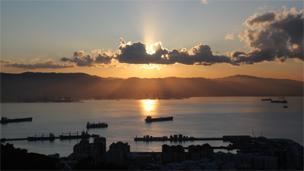Struggling Spanish find work in booming Gibraltar
- Published
Gibraltar prospers while Spain is mired in the economic crisis
In the morning rush hour at the border between Gibraltar and Spain virtually all the traffic flows in one direction.
About 4,300 Spaniards, who live in the area of Spain adjacent to the British territory known as "El Campo de Gibraltar", make the short commute into Gibraltar to work every day.
According to Juan Jose Uceda, from the Spanish Workers' Association in La Linea de la Concepcion, the border town with a population of some 70,000, there are around 12,000 people out of work there.
"Gibraltar is an escape", he said, "for so many people suffering a really bad situation here".
Gibraltar has close to full employment, and is a vital source of jobs for southern Spain, which is struggling with an economic downturn and government austerity measures.
Low-tax economy
One of the main reasons Gibraltar is an attractive option for businesses from abroad is its relatively low level of tax.

Algeciras port: Trade is paramount at the gateway to the Mediterranean
Foreign companies that based themselves in Gibraltar, but did business elsewhere, used to pay no tax at all.
And businesses doing business in Gibraltar used to pay 35% tax.
However, in 2011, after pressure from the European Union, Gibraltar's government introduced a new 10% flat rate of corporate tax.
Gibraltar's Chief Minister, Fabian Picardo, who took office after elections last November, says Gibraltar's corporate tax rate is only slightly higher than the Republic of Ireland's or Hungary's.
"Tax-free havens are a thing of the past," he says.
"There is competition over tax, just like there is competition over anything else."
'British Gibraltarian'
A local historian and tour guide, Tito Vadello-Smith, says his name sums up his identity.

Local guide Tito Vadello-Smith is proud of the Rock's separate identity
"You couldn't have a more Spanish name than Vadello, or a more English name than Smith," he boasts.
"But I am not Spanish, and I am not English. I am British Gibraltarian."
Gibraltar has been part of the UK since 1713, when Spain handed the territory to Britain as part of the Treaty of Utrecht.
The Spanish dictator Francisco Franco closed the border in 1969 after claiming that Gibraltar should be returned to Spain.
The border only reopened in 1982.
Since then members of the Spanish centre-right Popular Party, have made claims over the territory.
However, since the party took office in December there has been little public talk about Gibraltar's status.
'Engine for the region'
Today people on both sides of the border are keen to talk up the economic importance of Gibraltar's relationship with El Campo.
Tito Vadello-Smith describes Gibraltar as "the biggest factory in the region."
Gibraltar's economy has large sectors devoted to finance and banking, and shipping.
It has also become in the past few years a base for companies that run online betting sites.
Professor John Fletcher from Bournemouth University carried out a study in 2009 into the economic importance of Gibraltar for El Campo de Gibraltar.
He found that in 2007, Spanish people crossing into Gibraltar to work earned close to £43m.
"Gibraltar is a catalyst," he argued, "it provides an engine for growth in the region".
Prof Fletcher thinks that the economic relationship works both ways, in terms of trade and services.
"Gibraltar benefits from the region as well. It is not just one-way traffic."